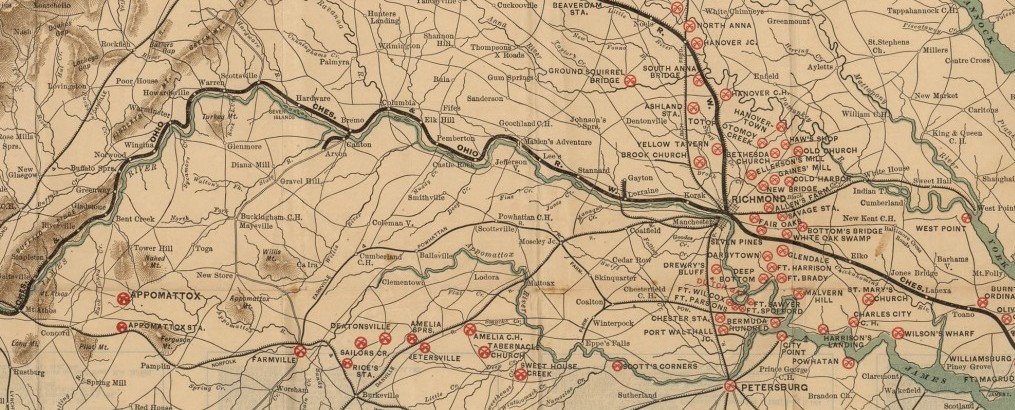How has memory of the American Civil War changed over the past few years in the South? What trends can be discerned and where specifically do we see this playing out? I was thinking about this earlier today as I was reading another story about a local community that has discontinued the tradition of honoring a Confederate holiday – this time, Confederate Memorial Day in Cullman County, Alabama. As many of you know this follows on the heels of Charlottesville’s decision to discontinue recognizing Lee-Jackson Day.
I’ve also been thinking about this in connection with a project that is still in the very early stages that involves turning my last ten years of blogging into a book of essays about recent Civil War memory. Much of what I have posted is about decisions on the state level and in local communities that involve how communities remember this history. Rather than rely on anecdotal evidence I would love to be able to say something more substantial about how Civil War memory has evolved. There are a number of possibilities.
It would be pretty easy to tag/label a Google Map with every decision made during the sesquicentennial that has anything to do with how a local community remembers/commemorates the Civil War. My interest concerns decisions made specifically by local and state governments, including proclamations, decisions about monuments, holidays, etc. Additional maps that include information pulled from census data, including racial/ethnic diversity and socio-economic status concerning specific communities could be added. Historical maps from the Civil War could be overlaid to help draw connections between the past and present.
So, who is up for taking on such a project?

Perhaps a tool like Neatline would be good for that. You could present a chronological version, and link to the original resolution, news article, etc., if that is available. Another good tool could be StoryMapJS. That is more linear, though, and doesn’t allow for as much casual browsing. Good for a chronological narrative though.
Great suggestions. Thanks, David.
I understand and I am looking forward to seeing the result of your work.
This is an interesting project, and I agree with the mapping suggestion.
I am not sure if I can offer you anything of substance to help you in this endeavor, but I do believe there is a small “movement” (perhaps that is too strong of a word) of people in the South who are trying to find ways to honor their confederate ancestors without being overtly offensive or controversial. I am not sure how you can include them in this project or even if you want to do something like that. I do think you will find the majority of Southerners are put off by the antics of the various “heritage” groups. These groups are on the margins of society and this is why their numbers are so small. Their antics are also a major contributing factor to the sweeping changes you are seeing. These groups do more harm to their cause then good.
Hi Leo,
There are a number of ways to go about tracking events/projects throughout the South, but I am interested primarily in what local and state governments have done and said in connection to the war in recent years.
I believe GIS Mapping could be an excellent way to capture all the data on one map because it allows you to layer that information.
Good point. Thanks, Chris.
As an Yankee who spent 18 months in Alabama and worked with others from Cullman it was interesting to read the comments at the end of the article.It was 25 years ago but it is no surprise that things havent changed. What a disappointment.
But things have changed. The decision itself is evidence of it.
Kevin, just to give you some context that you might not be aware of, Cullman County historically was a a stonghold of Klan activity and is today a very racially segregated area, with most of the county’s few blacks living in a small area known as “colony” (and it is usually referred to by whites in the area as “THE Colony.”) In this state, Cullman carries a heavy racist stigma that is stronger than even places like Selma. Blacks in this state still know that you don’t even stop at a gas station off the highway in Cullman. Trust me, when the article says that the reason they made this change is because people complained about the courthouse being closed, it is accurate. The change is not a result of their desire to stop celebrating the Confederacy.
None of this takes away from your proposed project, however.
Thanks so much for the update. So, am I to assume that the county will still issue some kind of proclamation regarding Confederate Memorial Day?
That I do not know. But I would not be surprised if a groundswell of political pressure is placed on the county commissioners that reverses the decision. It will be interesting to watch.
Well, the heritage fringe is up in arms. No surprise. Should indeed be interesting to see what happens.
Interesting contextual information, Glenn B. Here is a link to a page on Cullman County:
http://en.wikipedia.org/wiki/Cullman_County,_Alabama#Demographics
Cullman county is statistically “whiter” not just than Alabama, but than the United States. It has even fewer blacks by percent than Massachusetts. Probably many rural counties across the US share this demographic characteristic. For a book on places that discourage blacks from moving in, see James Loewen’s _Sundown Towns_.